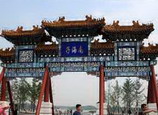
BANGKOK, June 10 (Xinhua) -- Regional cooperation under the framework of the Greater Mekong Subregion (GMS) provides sustained momentum to the development of China's southwestern provinces, according to Korn Dabbaransi, former deputy prime minister of Thailand.
In a recent interview with Xinhua, the senior Thai politician, who served three times as the deputy prime minister of Thailand, highlighted the significance of GMS cooperation in China's West Development Strategy a policy that has been implemented by the Chinese government since 2000 to help underdeveloped western region catch up with the more prosperous eastern region.
The GMS Economic Cooperation Program was started in 1992 by the six countries sharing the Mekong River -- Cambodia, China, Laos, Myanmar, Thailand and Vietnam. It aims to link the six countries through improvements in infrastructure, and thereby promote trade and investment and stimulate economic growth.
"GMS countries share the same land, same river and same culture. They have a closer bond than the ASEAN countries. Exchanges and cooperation within the region will bring benefits to all of us, especially China's southwest provinces, which are closely connected with the region," he said.
"The GMS region has much to offer, resources, labor, food, energy, all what China needs to push forward the policy to develop its western provinces," said Korn, who is now president of the Thai-Chinese Friendship Association and has visited China more than 100 times over the past 38 years.
However, Korn noted that compared with other popular cooperative mechanisms in the region such as ASEAN, GMS has been very much overlooked over the recent years.
"The 21-year-old GMS has met its bottleneck and it's difficult to deliver any concrete outcome at the present stage," he said.
Korn urged China, the largest country and key player in the GMS bloc, to take the lead to accelerate cooperation in the region.
As a deputy prime minister, Korn sailed downstream the Mekong River to travel from China's southwesternmost Yunnan province to Thailand's northern Chiang Sean city -- making him the first government leader to complete such an endeavor in the history of Thailand.
"It was a bid to show my support for the Greater Mekong Subregion cooperation," said Korn.
















 Developer razes historic Guangzhou structures
Developer razes historic Guangzhou structures


![]()
